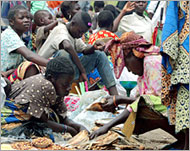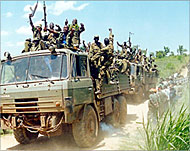UN approves troop deployment to Congo
The UN Security Council authorised a French-led international peacekeeping force to try and protect refugees from tribal massacres in Bunia, a remote town in the northeast region of the Democratic Republic of Congo
 |
| Thousands of Congolese have fled the town of Bunia |
The force will not be a United Nations mission, but the 15-member council unanimously voted to authorise it to use deadly force if necessary.
Human rights groups had pleaded with the UN for months to increase its presence in the Ituri region, where tens of thousands of people have been killed in recent years.
The last few weeks however, have been especially deadly with at least 400 killings in the past three weeks alone.
There have been warnings of a potential genocide on the scale of Rwanda, where 800,000 were slaughtered in 1994.
As many as 1,400 troops–mostly French, will be deployed to Bunia with a mandate to prevent further bloodshed. They are expected to start arriving in the first week of June, and stay until 1 September, according to UN announcements.
The troops will join the already 600 UN peacekeepers already deployed under the 1999 Congo peace plan.
Despite the four-year-old peace plan – reports of massacres, widespread rape and cannibalism have been emerging from Bunia since late last year.
Violence became particularly worse when neighbouring Uganda pulled out of Congo earlier in May as part of a peace plan designed to put an end to the nation’s nearly five-year-old civil war.
The resulting power vacuum enflamed long-standing ethnic and economic tensions between the region’s Hema and Lendu tribes.
 |
| Ugandan troops left Congo in mid May as part of the peace plan |
‘Calm but volatile’
Hema fighters, which make up the Union of Congolese Patriots have taken control of Bunia, UN officials said. They described the situation as being calm but volatile, with many of its 250,000 citizens fleeing or taking shelter in UN compounds or camps near the airport.
Although Lendu and Hema farmers have long fought over land, violence between the two tribes has been exacerbated by Ugandan and Rwandan support.
A key factor in the continued bloodshed has been the falling out between these two former allies. Recent fighting in the northeast has been attributed in part to that split.
Analysts say that solving the problems in the northeast is essential to ending a war that has claimed an estimated 3 million lives across Congo.
“Someone once said that as long as there is conflict in the Ituri district, there will be no peace in the Congo,” Sergio Viera de Mello, the UN High Commissioner for human rights, said last week.
“I think sending an international force is the only solution. . . . I find it outrageous that in 2003, we can allow people to be butchered without responding forcefully.”
The war has left Congo divided roughly in half, with the rebels controlling the east and north and the government holding the south and west.